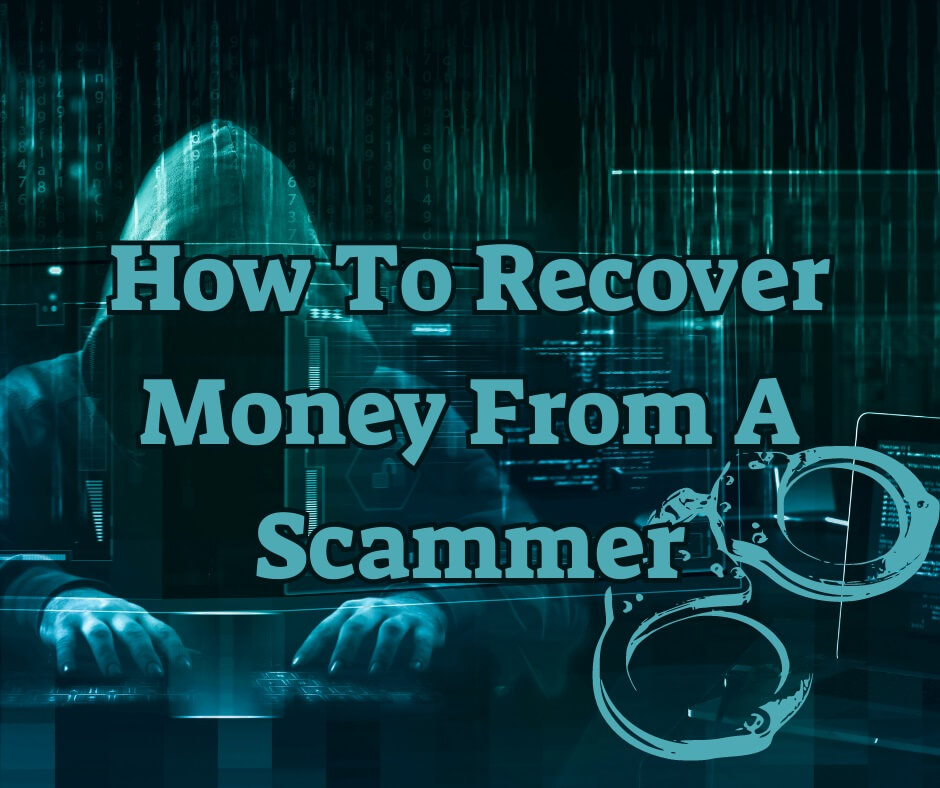Every year, countless individuals fall prey to online scams that cost them significant financial loss. This unfortunate event can be devastating, and it often feels like there’s no way to recover the lost money. However, if you’ve been the victim of a scam, it’s essential not to lose hope. In this article, we’re going to delve into how to recover money from a scammer and the steps you need to follow to increase your chances of getting your money back.

The first crucial step in learning how to recover money from a scammer is recognizing that you’ve been scammed. Scams can take various forms, from email phishing and lottery scams to investment fraud and fake online marketplaces.
Once you’ve identified the scam, the most important thing to do is stop all communication with the scammer immediately. This action will prevent you from losing any more money and potentially leading the scammer to other potential victims.
Next, you should report the scam to your local law enforcement agency and to your country’s anti-fraud body. In the United States, for instance, you should report the scam to the Federal Trade Commission (FTC). Include all details about the scam, such as how you were contacted, the promises made by the scammer, and the amount of money lost.
The actual process of how to recover money from a scammer depends on how you sent the money. The steps can be different for bank transfers, credit card transactions, or online payment platforms.
If you transferred money via your bank, you should contact them immediately. Banks have fraud departments that deal specifically with these situations. They can guide you on the steps you need to take, which often involve filing a formal complaint and providing all related documentation. Banks can sometimes reverse the transaction, especially if you act promptly.
For credit card transactions, you may have more protection. Credit card companies have policies that protect against fraudulent transactions. If you’ve fallen victim to a scam, you can dispute the charges with your credit card company. They will investigate the issue and may be able to refund the transaction.
If you used an online payment platform like PayPal or Venmo, contact their customer service right away. These platforms also have protections in place for fraudulent transactions. Depending on their policies, they may be able to help you recover your money.
There are several online resources available that can aid in the process of how to recover money from a scammer. These resources often have forums where you can share your experience and potentially learn from others who have been in similar situations.
Reputable websites, like the Better Business Bureau, provide advice and can guide you on how to report the scam and start the recovery process. You may also want to consider hiring a professional to help, such as a lawyer or a private investigator, especially if a significant amount of money is involved.
While recovering your money is crucial, it’s just as important to learn from the experience and take steps to prevent future scams. Be cautious when dealing with unfamiliar individuals or companies online, especially those who make offers that seem too good to be true.
Always take the time to research and confirm the legitimacy of the entity with whom you’re interacting. Look for reviews or complaints online, and check with consumer protection agencies. In transactions, use secure payment methods and be wary of requests for payment through non-secure methods or wire transfers.
Educating yourself about common scams and their red flags is the best defense against becoming a victim. This education is as important as knowing how to recover money from a scammer because prevention is always better than cure.
In conclusion, the journey of how to recover money from a scammer can be complex and challenging, but not impossible. By acting quickly, reporting the scam to the relevant authorities, and using the resources available, you can increase your chances of reclaiming your money. Above all, remember to remain vigilant in the future to prevent falling victim to scams again.
If you are a victim of online scams, please let us know by commenting below and if you have lost a significant amount of money, do not lose hope. We can help you recover your funds!

Internet Crime Complaint Center (IC3)
In Partnership with: FBI/NU3C/IAI
REF: FLP-IP/2422-FM10089/0877
Our records indicate that you are eligible to receive restitution amounting to the sum of USD9.1M for one or more of the internet fraud schemes you’ve been a victim of recently.
You are required to provide your Full Name, Home Address,
Phone Number, Nearest Airport, Mailbox number, Occupation.
For immediate payment of your restitution funds
Marina Parker
Head of Operations.
— Ursprüngliche Nachricht —
Von: Enrique Ayala
Datum: 05.12.2024 01:01:18
An:
Interbureau@emailn.deBetreff: Fwd: INTERNET CRIME COMPLAINT CENTER
———- Forwarded message ———
From: Enrique Ayala
Date: Wed, Dec 4, 2024, 6:59 PM
Subject: Fwd: INTERNET CRIME COMPLAINT CENTER
To:
———- Forwarded message ———
From: Enrique Ayala
Date: Tue, Dec 3, 2024, 7:21 PM
Subject: Re: INTERNET CRIME COMPLAINT CENTER
To: COMPENSATION TRANSFER FUND
Yes like 2 or 3 months ago some one went in two my phone my cash app my bank accounts my Gmail my address my old address i mean everything my social security number that person destroyed me . My family my friends did not want to believe me with what i was going true i almost got kicked out for it but i know that i was not giving up and I gived who ever it was hacking me a fight but eventually they ended up taking over my hole life private photo’s everything!!
On Mon, Dec 2, 2024, 8:05 AM COMPENSATION TRANSFER FUND wrote:
Internet Crime Complaint Center (IC3)
In Partnership with: FBI/NU3C/IAI
REF: FLP-IP/2422-FM10089/0877
You are required to provide your Full Name, Home Address,
Phone Number, Nearest Airport, Mailbox number, Occupation.
Contact email:
InterBureau@emailn.deOur records indicate that you are eligible to receive restitution for
one or more of the internet fraud schemes you’ve been a victim of recently.
Necessary case details shows apprehended internet fraudsters
from African countries which were arrested on felony charges in Africa,
year 2022 has officially been closed.
The case was closed based on the following terms;
1.Restitution Order:
seized assets shall be liquidated and converted into a restitution fund,
2. Time served plus 10 years probation, means all the scammers will be
in the jail for the next 10 years the perpetrator and his group of
co-offenders had over 2000 aliases originating from China, Russia,
Nigeria, Ghana, London, and many African country’s masking their
Original Identities. Our records indicate that you have been a victim of
fraud because your contact details were found on several devices
belonging to the perpetrator.
Following court orders, this makes you eligible to receive restitution
for damages caused by this criminals Being that operated on an
international scale and victimized thousands of individuals and
companies of several nationalities;
We determined that the investigation had to be kept private and away
from public media to maintain unitary judgment and integrity in
International Relations. Because this was a private investigation, all
victims (including yourself) were represented by a professional
court-appointed public defender. (European Law Firm) with over 10 years
of experience on similar cases. After having consistently pursued the
(subjects) case for two years, successfully secured restitution payments
of USD$9.1M Dollars for being a victim.
You can email your details or complaint to Revd. David Touch, the Authorization officer
at Contact email:
InterBureau@emailn.deRegards…
Marina Parker
Head of Operations.
I need two know if this is a scam thank you.
Dear Enrique,
Thank you for reaching out. Based on the information you’ve shared, this email appears to be a scam. Fraudulent messages like this often use official-sounding language and large restitution amounts to deceive victims into providing personal details. Genuine authorities like the IC3 or FBI will not request sensitive information such as your full name, address, or nearest airport via email.
Please do not respond or provide any personal information. If you suspect fraud, consider filing a report directly with the IC3 at ic3.gov to ensure your concerns are addressed by legitimate authorities.
Stay safe,
Ben
ReportYourScam.com
Hi my family is on disability my grandpa is on hospice
We had what we thought was our church friend trying to sell us a car turned out it was a scam the account was hacked and the stole almost $2000
Dear Morgan,
I’m truly sorry to hear about the distressing situation your family is currently facing, especially with your grandpa being on hospice. It’s deeply unsettling to learn that someone you trusted, even indirectly through a supposed church friend’s hacked account, has scammed you out of nearly $2000. In times of vulnerability, such betrayals can feel especially devastating.
Here are some steps you can take to address this situation and possibly recover your lost funds:
1. Report to Local Authorities: Immediately report the scam to your local police department. Provide them with all the information and correspondence related to the scam. This official report can serve as a foundation for any legal action that may follow and is often required for further steps in the recovery process.
2. Contact Your Bank: If the transaction was made through a bank or a payment service, contact them as soon as possible. Many financial institutions have procedures for dealing with fraud and can sometimes reverse fraudulent transactions if they are reported quickly.
3. Secure Your Information: Ensure that all your online accounts are secure. Change passwords and implement two-factor authentication wherever possible to prevent further unauthorized access.
4. Fraud Alerts and Credit Monitoring: Consider placing a fraud alert on your credit reports and monitoring your financial accounts for any unusual activity. This can help prevent identity theft and additional fraudulent charges.
5. Support Resources: In such trying times, emotional and legal support can be invaluable. Look into community support services for your family, especially considering your grandpa’s health situation. Legal aid services can offer guidance or representation if you decide to pursue legal action against the scammer.
Please know that you’re not alone, and there are resources and communities ready to support you and your family through this. While the process of recovery can be challenging, taking these steps can help protect your family and potentially recover the lost funds.
Feel free to reach out if you have further questions or need guidance on any of these steps.
Sincerely,
Ben from ReportYourScam.com